Khoury News
Fellowships, scholarships, awards: Khoury students earn national and university honors in 2023
Northeastern students produce outstanding work every day, but every year, a few are honored for truly exceptional work in academics, research, and post-graduate work with fellowships, scholarships, grants, or university […]
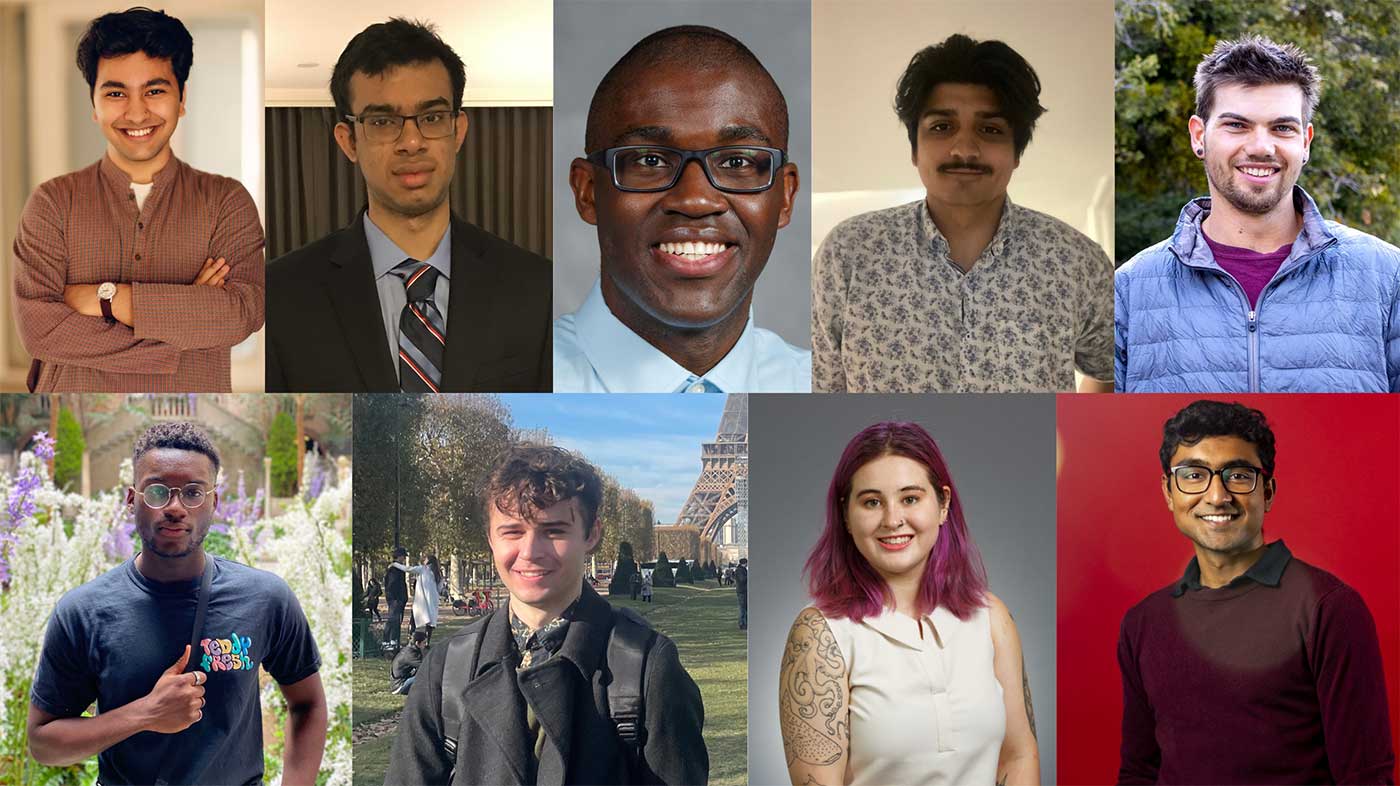
Northeastern students produce outstanding work every day, but every year, a few are honored for truly exceptional work in academics, research, and post-graduate work with fellowships, scholarships, grants, or university awards. They work to improve wildfire readiness, craft affordable and accessible migraine diagnostic tools, ensure social media advertising doesn’t perpetuate systemic racism, help robots learn independently, and more. To learn about nine of this year’s Khoury College honorees and the work they plan to pursue, click on the names below, or simply read on.
- Muhammad Ali: Outstanding Graduate Student Award in Research
- Tejas Sathyamurthi: Harold D. Hodgkinson Award
- Brandon Onyejekwe: Sears B. Condit Award
- Siddharth Simon: Barry Goldwater Scholarship
- Michael Nelson: Fulbright Scholarship
- Ben-Oni Vainqueur: Graduate Education for Minorities PhD Engineering Fellowship
- Liam Pavlovic, NSF Graduate Fellowship
- Alyssa Smith, NSF Graduate Fellowship
- Vivek Kanpa, George J. Mitchell Scholarship
Note: This story highlights students chosen for Northeastern University awards and external honors. Khoury College also handed out its own student awards in 2023; those are covered here.
Muhammad Ali: Outstanding Graduate Student Award in Research
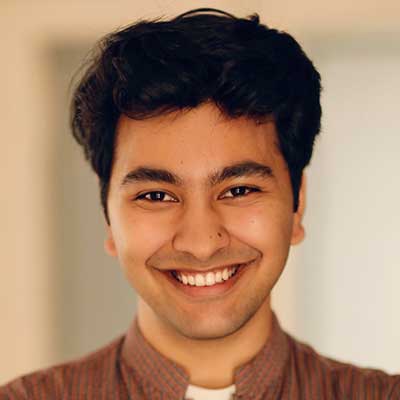
The motto in Silicon Valley may be “move fast and break things,” but Muhammad Ali would like to slow down and stop breaking things for a minute — particularly when the things breaking are housing justice, employment equity, and the democratic process.
Ali, who is pursuing a PhD in CS, was recently awarded the Outstanding Graduate Student Award in Research for his work investigating algorithmic bias and automated decision-making in social media advertising systems, particularly Facebook. Algorithmic decision-making has proliferated wildly in the past few years, and it’s Ali’s job to study whether those systems are working as advertised or are inadvertently causing harm. The latter is all too frequent.
“Advertising isn’t just used for advertising sneakers and mattresses; advertising is also used for advertising jobs, for political advertising.” Ali said. He gave the example of an ad for a janitorial job; even without any specific targeting, Facebook’s algorithm showed the listing mostly to Black women, to whom it had decided the job was “more relevant.”
“It becomes a snowball effect where you’re only serving users one kind of content, they’re engaging with it, and they’re stuck in this feedback loop,” Ali said. “It reduces diversity, and it can end up having both individual and social consequences.”
The U.S. Department of Justice used the discriminatory behaviors identified in Ali’s research as part of its basis for pursuing a case against Facebook for violating the Fair Housing Act. The parties settled in 2022, with Facebook agreeing to make concrete changes such as the Variance Reduction System to mitigate the biased outcomes of their algorithms. Ali even testified before the U.S. House of Representatives, a level of impact he had never imagined having as a graduate student. But not everyone is on board with his chosen research niche.
“As soon as you start measuring the impact of things, people start questioning whether that is research at all. I’ve gotten plenty of pushback — and dozens of internship and job rejections — because people perceive you as holding back progress,” Ali said. “I’ve even had conversations with my advisor Alan Mislove about this; we are of the view that we are a few years ahead of the curve. We as computer scientists have broken too many things, and sooner or later, as more and more regulation comes, you will need people to measure things.”
Ali is one of five recipients of Northeastern’s 2023 Outstanding Graduate Student Award in Research, which recognizes students with an exceptional ability to conduct high-level research and make contributions to the scholarly literature in their fields.
Tejas Sathyamurthi: Harold D. Hodgkinson Award
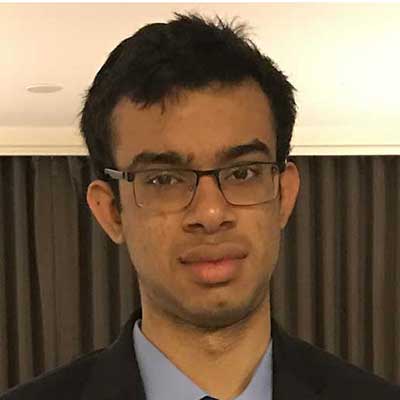
Tejas Sathyamurthi’s research career was sparked — literally — by a family trip to California when he was in high school. He and his travel companions passed a small fire burning beside the road while driving down State Route 24; for Tejas, who was born and raised on the far less arid and fire-prone East Coast, the sight was a shock.
“I envisioned the fire spreading, engulfing everything, and swelling up. While that wasn’t the case in this instance, it inspired me to think about fires and how devastating that could be,” Sathyamurthi said. “I was curious what kinds of things people could do to address wildfires: to solve them, to mitigate them after they’ve burned, or maybe something to predict them?”
That question kicked off some eight years of on-and-off research into a machine learning algorithm that could predict when and where wildfires would occur. Taking into account weather factors like rain, wind, and humidity, Sathyamurthi built a model that predicted fires with 76 percent accuracy. He won first place for undergraduate CS research when he presented his model at RISE 2020, Northeastern’s annual student research exposition. He has continued to develop the model since then, working to incorporate non-weather factors such as power grids and areas of human activity.
In the spring of 2020, Sathyamurthi applied his climatology modeling experience to something new: the emerging COVID-19 pandemic. Working with Auroop Ganguly at the Sustainability and Data Science Lab, Sathyamurthi worked to analyze what assumptions different types of COVID models made, what they did and didn’t do well, and what kinds of models best predicted the spread of the disease. He and his team also applied a multimodal super-ensemble approach, a technique usually used to predict weather patterns, to try to predict the spread of COVID-19. He presented the approach at the American Geophysical Union’s fall 2020 meeting.
“COVID was a serious, serious issue at that point; there wasn’t a vaccine, we were all sheltering remotely at home,” Sathyamurthi said. He wanted to contribute to the solution, and said that “having the opportunity to combine this climate research I’d done, and having exposure to how a climate model could be involved with making predictions for COVID, I thought was fascinating. I thought it would be very valuable to contribute to a project that would inform COVID models.”
Sathyamurthi is one of four recipients of the Harold D. Hodgkinson Award, which honors exceptional academic and experiential performance from graduating seniors at Northeastern University. He received a $2500 award to recognize and support his academic journey.
Brandon Onyejekwe: Sears B. Condit Award
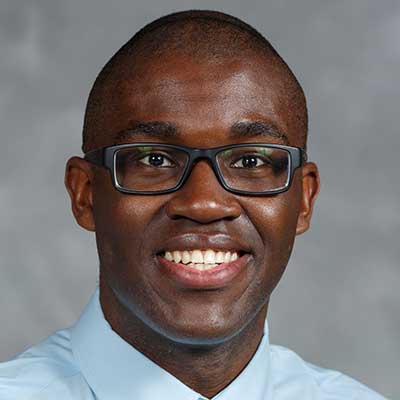
Brandon Onyejekwe has always loved math, but when he arrived at Northeastern, he wanted to find a way to apply it to other subjects. He initially thought that mission would lead to a cross-section of math and economics — until he took Programming with Data with John Rachlin as an economics elective.
“I walked in the first day and Professor Rachlin was talking; it was inspiring the way that he would talk about how computers have evolved to process so much information, that you can do so many cool things with them,” Onyejekwe said. “I felt like this was the subject that I could actually do large-scale things with. Then as the weeks progressed, I learned that I could also code decently.”
Now a data science major with a math minor, Onyejekwe has found a slew of ways to apply math to other disciplines. The most direct example is his work with the Northeastern Summer Math Research Program under PhD candidate Finn Prideaux, where he used Python code to run probabilistic analyses to represent a complex set of mathematical objects called matroids. The application most likely to touch his fellow Bostonians’ lives was his work restructuring the MBTA’s data pipeline for his last co-op, making it easier and more efficient to retrieve and analyze financial data.
His favorite project, though, has been the chess-playing AI he helped to build for his Advanced Programming with Data class during his second year.
“I found that really fun because, one, I really like chess, and two, it was really nice to see that I could do something as large-scale as that just from the things that I’ve learned in the last few years,” Onyejekwe said. “A lot of Khoury classes are structured so that you take what you learned throughout the semester and apply that in a large-scale project that compiles all that information together and really shows what you learned in that domain.”
Onyejekwe is one of seven recipients of the Sears B. Condit Award, an endowment providing scholarships to Northeastern juniors and seniors who display outstanding scholastic achievement. Onyejekwe will receive a $3500 scholarship.
Siddharth Simon: Barry Goldwater Scholarship
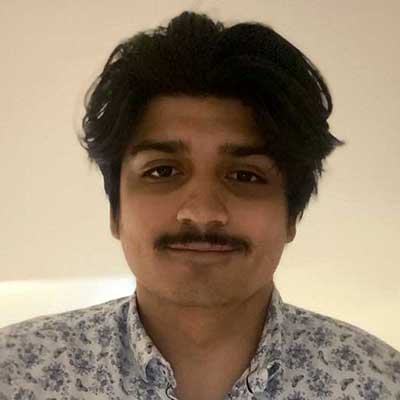
From a young age, Siddharth Simon knew he didn’t want to pursue medicine. Though he loved the way it combined social interaction and analytical thinking, the interesting problems and solutions it presented, and the way it touched people’s lives, there was one major trepidation: both of his parents were doctors. He recalls thinking, ‘Anything but that!’
But tack on a few years and a very impactful job shadowing experience, and Simon is pre-med — a fifth-year computer science and computer engineering combined major approaching neuroscientific problems from a machine learning perspective. He began his research career at Northeastern’s Brain Simulation and Stimulation Lab, where he used algorithmic tools to optimize the placement of electrodes on a patient’s head during a brain scan. He later spent time at Harvard Medical School’s Brain Modulation Lab improving storage and retrieval of data from NeuroPace devices, which monitor the brains of epileptic people to predict and control seizures. He then joined Lisa Gfrerer’s independent team, where he helped develop an app that identifies the nerves responsible for migraine pain to ensure the patient can request referral to the correct specialist.
“The app is symbolic of a lot of things in biotech and health care,” Simon said. “It’s not very complicated … but the potential is there for high impact. Those are the projects that make me really excited.”
That immediate and scalable computing impact is what keeps Simon interested in medicine. After he graduates next year, he plans to apply for a Fulbright Scholarship to work with health data infrastructure in a low-income country.
“One thing that really stood out is how slow health care is to implement new technology. Other industries are running laps around us, so to speak,” Simon said. “There’s obviously a lot more responsibility when someone’s life can be directly affected, but that also offers a lot of opportunity for growth. At a time like this … trying to fight for more equity through technological innovation might be viable.”
Simon is one of 413 students honored this year with the Barry Goldwater Scholarship, which seeks to identify, encourage, and financially support college sophomores and juniors who show exceptional research and leadership promise in natural sciences, engineering, or mathematics. He will receive $7500 to support his research, and plans to continue work with the migraine app.
Michael Nelson: Fulbright Scholarship
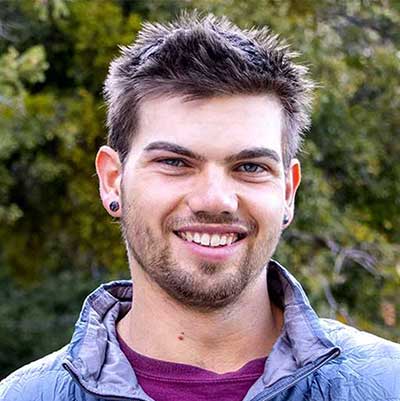
Michael Nelson has spent more than half of the last two years in a tent. From his work as a crew leader with American Conservation Experience — a nonprofit that works to restore America’s public lands — to his years as a member of the Northeastern University Huskiers and Outing Club, Khoury College’s latest Fulbright Scholar has made the outdoors a central focus for his life. Now headed to Laos to teach English and explore the culture and countryside of southeast Asia, the computer science and physics alumnus is ecstatic to align his love of the natural world with his career ambitions.
“When I was a Northeastern student, I was lucky enough to cross paths with meditation techniques that eventually changed my life,” Nelson said in an interview with Northeastern Global News. “Laos is home to the cultural and spiritual influences that allowed these practices to spread across the world, and I feel obligated to give back to the land and the people that helped me as best I can.”
While teaching English language skills, Nelson also plans to start an outdoor program to connect families and children with nature in a way that makes his students feel confident and empowered. He would like to facilitate cycling, hiking, and camping trips to exchange cultural insights with his students about how people from different parts of the world interact with nature.
Nelson also hopes his Fulbright experience can kick off a longer career as an outdoor educator. Nelson would love to instruct students learning to rock climb, backpack, and downhill ski, and his ultimate goal is to become a mountain guide abroad.
“This opportunity is incredibly important to me … Fulbright allows me to truly test my adaptability while being able to experience intimate cultural immersion,” Nelson said. “Teaching people how to care for the land and watching them grow is very exciting and heartening. There is so much wisdom and beauty to be found in nature and being able to facilitate access to others motivates me to get up each morning.”
The Fulbright program awards roughly 8,000 grants annually to support U.S. citizens teaching, conducting research, and carrying out professional projects around the world.
Ben-Oni Vainqueur: Graduate Education for Minorities (GEM) PhD Engineering Fellowships
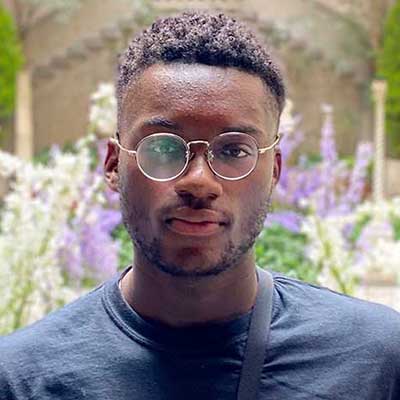
For Khoury’s newest Graduate Education for Minorities (GEM) Fellow Ben-Oni Vainqueur, a functional understanding of technology has never been good enough — he has always wanted to take his devices apart and figure out how they work. So when he came to Northeastern to pursue robotics, a computer science degree alone wasn’t going to cut it; Vainquerer elected to pursue a computer engineering major as well.
“Coming to college, I learned that there are a lot of people in robotics who are very good in a certain field and they will apply that to robotics, and I saw another skill: people in the field who could move from topic to topic,” Vainqueur said, adding the combined major “gave me a lot more confidence in approaching topics that can seem very imposing.”
Simultaneously taking computer science and computer engineering classes helped Vainqueur to draw interesting connections between chunks of information, which helped him to understand computation on a deeper level. This made him equally suited to software positions — like his first co-op at Amazon Robotics in the fall of 2021, deploying software on large distributed systems with zero downtime — and to hardware positions like his second co-op in the fall of 2022, doing machine learning and firmware integration with Microsoft. Seeking even more robotics, Vainquerer also participated in Northeastern’s Mars Rover club, where he handled the vehicle’s autonomous navigation problems using skills he built with Northeastern’s Robotics and Intelligent Vehicles Research Laboratory (RIVeR) Lab.
READ: Northeastern students pour software engineering skills into Mars Rover
Vainqueur graduated in May and is pursuing a master’s degree in electrical and computer engineering with a concentration in software and hardware for machine intelligence through Northeastern’s PlusOne program. He plans to pursue a PhD, but he’d like to spend a few years in industry first — potentially taking advantage of the fellowship’s guarantee of post-graduation employment with GEM partners like Adobe, IBM, or SpaceX. Wherever he goes, though, his inquisitive nature means he will always be learning.
“It has been very interesting to be in the field of robotics when things are changing so fast,” he said. “That’s why the educational aspect is surefire to me; I’m not going to ever learn anything useless.”
Vainqueur joins over 3,000 current and former GEM PhD Engineering Fellows — students from underrepresented backgrounds who the program has supported in their graduate pursuits. The fellowship provides not only the post-graduate employment guarantee, but also two summer internships with a GEM employer and a tuition-and-living-expense stipend.
Liam Pavlovic, NSF Graduate Fellowship
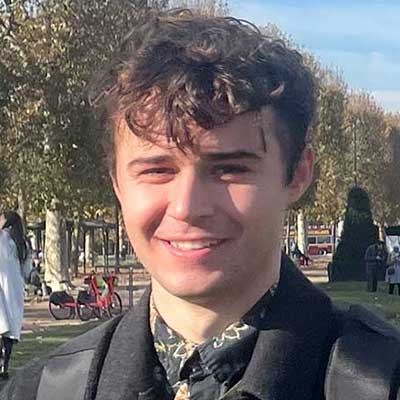
For the past five years as an undergraduate and now as a first-year graduate student, Liam Pavlovic has invested his time in artificial intelligence, specifically in uncertainty awareness — the ability of robotic systems and algorithms to recognize and account for uncertainties in their perception, decision-making, and actions.
“My goal is to make intelligent agents that can explore and learn reliably with minimal human guidance,” Pavlovic said. “This way robots can be sent into the world and allowed to learn on their own while not destroying everything in their path.”
Pavlovic’s work aims to make robots predict the possibilities of their actions in terms of percentage chance of success, instead of simply quoting yes-or-no binaries. For instance, if a self-driving car faces an obstacle, it would have to choose whether to brake, ease up, or continue on. That requires the car to choose, and as Pavlovic noted, “Current machine learning algorithms applied to robots struggle to identify all potential solutions in the real world.”
Pavlovic’s interest in research materialized during his undergrad years as he verified third-party-run neural networks and worked on the complexity theory problem, which estimates how much time and memory is needed to solve complex problems. But it was during his 2021 internship at the European Synchrotron Radiation Facility in Grenoble, France that Pavlovic was inspired to work on uncertainty awareness, by seeing that algorithms could be “self-supervised” to train themselves on data and make decisions. And after returning to Khoury College and working on a robotics project for Seth Pate’s natural processing course during the spring of 2022, Pavlovic developed a keen interest in whether robots could comprehend the inherent risks of an action without explicit instructions.
Soon afterward, Pavlovic applied for and won the National Science Foundation (NSF) Graduate Fellowship, a five-year fellowship awarded to 2,700 graduate students to pursue research in science, engineering, and mathematics. He hopes to use it to further his dream of making robots learn independently, especially by testing them — a challenge given that robots need to learn more quickly than traditional web-based algorithms and cannot make mistakes that endanger users.
“This grant will enable me to scale up my research to more complex and deployable robots that consider all possibilities of actions, and which can be used in industry,” Pavlovic explained. “Once I am done with my PhD, I hope to have techniques that enable robots to better understand uncertainty. I want to then develop software and algorithms that use that uncertainty awareness to make better decisions.”
Alyssa Smith, NSF Graduate Fellowship
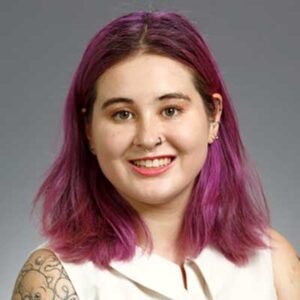
Alyssa Smith, a second-year graduate student at the Khoury-affiliated Network Science Institute, is another recipient of the NSF Graduate Fellowship for her work on computational social science, namely how social media networks form over time and how people create communities and coalitions online.
“I am happy that the fellowship recognizes work that studies social and societal implications of technology,” Smith said. “This indicates a firm resolve to diversify STEM and make it a more welcoming place.”
After earning degrees in comparative media studies and computer science from MIT, Smith worked in tech for four years before coming to Northeastern as a graduate student. And after heading the LGBTQ+ employee resource group at her second job, Smith discovered a passion for tech policy.
“We tried to get people together to advocate for groups in the company,” Smith said. “Though we didn’t get much traction, it was an interesting learning experience on how to push for change in an organization that considers itself to be doing just fine as it is.”
Smith realized that employee and conduct policies at many technology companies had inherent biases centered around gender and disability, which are easy to ignore if the authors of those policies come from similar backgrounds.
“Often, data is considered an objective truth without accounting for the social factors and biases that may be influencing data itself,” Smith said. “My aim is to make people think holistically about machine learning algorithms driving social media platforms and other data-generation software. Just because the numbers concerning diversity and representation are going up does not mean that everyone’s getting a fair share of the pie.”
Smith believes that this fellowship will help her bring forward more research on this topic.
“I care about how data can be biased against certain communities unknowingly,” she said. “Companies must realize that it’s not just a numbers game; growth does not always equitably reach all communities and that’s what I feel the future of tech policy will address.”
Vivek Kanpa, George J. Mitchell Scholarship
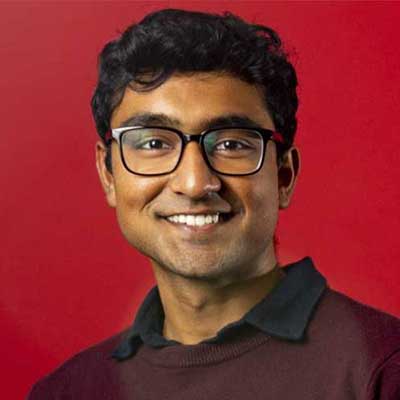
Vivek Kanpa, who concluded his undergraduate studies in May, was honored with the George J. Mitchell Scholarship, awarded to Americans between the ages of 18 and 30 to pursue a year of fully funded postgraduate studies in Ireland or Northern Ireland.
READ: Bio-inspired, data-driven, Dublin-bound: Vivek Kanpa wins Mitchell Scholarship
A combined major in biology and computer science, Kanpa loves working at the intersection of both fields to ask questions previously impossible to tackle without computer science. He says he realized the potential of that intersection while working to find new protein targets for cancer immunotherapies. Through his co-op experiences at Takeda and Revolution Medicines, along with his part-time research on oxidative stress in the lab of Javier Apfeld, Kanpa has developed a unique skill set in bioinformatics, handling large amounts of data and hands-on lab practices.
“Personalized and equity-based health care seems to be the next generation of medicine,” Kanpa told Khoury News in December. “Going to University College Dublin for a fully funded program on artificial intelligence in medicine will give me access to state-of-the-art biopharmaceutical resources to deliver my dream.”
Eager to develop computational tools and machine learning models to make precision medicine the new reality, Kanpa eventually wants to pursue a doctorate in the interdisciplinary field.
“I was always interested in making an impact on health care,” he said. “I feel fortunate to use my skill set in computer science to stay at the forefront of cutting-edge research.”
The Khoury Network: Be in the know
Subscribe now to our monthly newsletter for the latest stories and achievements of our students and faculty